-
JULY TALES/CONTES DE JUILLET (Guillaume Brac 2017)
GUILLAUME BRAC: JULY TALES/CONTES DE JUILLET (2017)
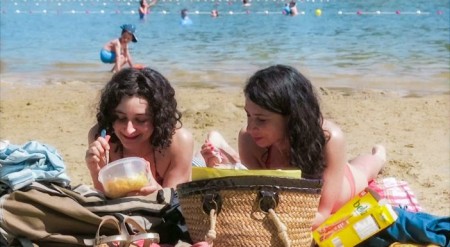
LUCIE GRUNSTEIN AND MILENA CSERGO IN JULY TALES
Brac's summer tales evoke, but contrast with, Éric Rohmer
Brac's 2013 Tonnerre was shown in the 2014 Rendez-Vous with French Cinema and we reviewed it then.
The word "conte" and a summer setting for two short films with young people flirting with each other sounds like Eric Rohmer, but in Guillaume Brac's more contemporary "tales" set in the suburbs of Paris there is a lot less civility and restraint and the disappointments are brutal and quick. In the first, "L'Amie de dimanche" ("The Sunday Friend"), two young women coworkers,Lucie (Lucie Grunstein) and Milena (Milena Csergo) go on a park outing to the greater Paris amusement center at Cergy-Pontoise.
After a bathe and a picnic lunch, they are approached by a young male park worker called Jean (Jean Joudé) whose design is clearly not to help but to connect. This deeply disappoints Lucie, the one he doesn't focus on, and that she is described as always pouty and unhappy sounds like Rohmer. True to Rohmer plot patterns, when the shy Lucie goes off by herself, she does quite well, actually better than her friend.
Lucie meets a young man practicing fencing, Théo (Théo Chedeville), who develops an interest in her and a connection, through giving her an impromptu fencing lesson. They plan on a date. Meanwhile the other couple discover they went to the same schools, only then Jean was a fat boy ("like all teens," he says) and now he's dark, well-built and robust. When they return to a park base his involvement with Milena causes his girlfriend, Kenza (Kenza Lagnaoui), who is at the park working too, to break up with him, and they come to blows. Things between Jean and Milena end messily.
The second "conte" is called "Hanne et la fête nationale" ("Hanne and the National Holiday"). The national holiday is France's, July 14th. Hanne, a Norwegian university student who has been studying in Paris, has encounters with three boys on this day, which ends with tragic news of the terrorist attack in Nice. When Hanne wakes up in her dorm room, an Italian student, Andrea (Andrea Romano) is lying beside her touching her and apparently beginning to masturbate - a situation one can't imagine happening in Rohmer. All day Hanne fends off Andrea, who claims to be in love with her. She meets a more polite but pushy French boy out on the street, Roman (Roman Jean-Elie), who invites her to a holiday party with friends that evening in a flat he says has a view of the Eiffel Tower.
Hanne resists Roman but is on the verge of accepting when Andrea appears and punches Roman in the nose - another very un-Rohmer event. He bleeds profusely, or thinks he does, and after a visit from a campus fireman called Sipan (Sipan Mouradian), Roman departs, expecting Hanne to come to his party. But she stays with Salomé (Salomé Diénis Meulien), a student of quantum physics, Andrea, and Sipan, who's invited to stay. This little multinational gathering at the Ciné Universitaire in the 14th arrondissement of Paris goes well till, during an interpretive dancing performance by Sipan accompanied on the guitar by Andrea, Salomé goes off in a huff after Hanne, now drunk, seems to make a play for Sipan, whom Salomé had her eye on. Left alone, and beginning to see a lost opportunity in her rejections of Andrea, Hanne hears the news from Nice and gets ready to fly home to Norway.
Have times changed for the worse since Rohmer, or is Brac's film style just rougher than his? Nonetheless Brac's two tales are well constructed, even if they come off a little more like student short films than the work of a finished auteur, though for the younger generation of French cinephiles, as indicated by a well-informed piece about these Tales on the film website Citizen Poupe that I've drawn on for information in this review, do consider him to be one.
Joseph Owen wrote a short English language review of this film at Locarno, August 2017, in The Upcoming , but it seems to have been little commented on.
July Tales/Contes de juillet, 68 mins., debuted at Locarno, Aug 2017. It was screened for this review as part of the Rendez-Vous with French Cinema (UniFrance/FSLC), New York, March 2018. French theatrical release coming "prochainement," according to AlloCiné. If the Tales do come out in French cinemas, we will see how the Parisian critics receive them.
Showtimes March 9 2:15 PM
March 12 9:30 PM
Last edited by Chris Knipp; 03-10-2018 at 10:39 AM.
-
THE LION SLEEPS TONIGHT/LE LION EST MORT CE SOIR (Nobuhiro Suwa 2017)
NOBUHIRO SUWA: THE LION SLEEPS TONIGHT/LE LION EST MOR CE SOIR (2017)
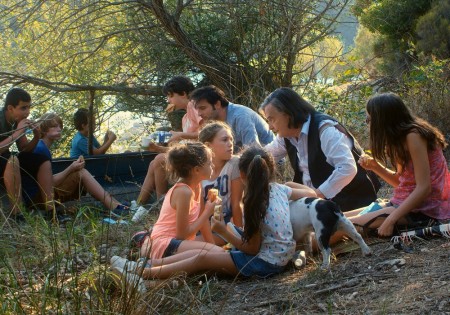
A meditative, playful vehicle for Jean-Pierre Léaud and a group of children
A vehicle for Jean-Pierre Léaud, about the making of a film, or two films within the film. The star must leave the shoot when it is delayed and seeks to visit an early greatest love, and is visited by her ghost, or imagines he is talking to her. At an old building where he goes to find her, he is found by a group of children who are making a film of their own. They run around, and when they enter an old room they have found as a set, they are startled to find "Jean" (Léaud). They are frightened at first, but then Jean enters into a friendly and lighthearted relationship with them, and participates in their film, which turns into a rough, simply conceived French vesion of "Ghostbusters." Then he returns to the film he is acting in, where he has a very brief scene in which he dies.
In the course of this, Jean confronts his past a bit, and has some conversations with Julie (Pauline Étienne), his girlfriend who died young.
The scenario seems confused on this point, because first Jean seems not to know that Julie is dead, and died very young, then knows that it may have been suicide, and that it was by a lake he take the children to. There is a lion, and several renditions by Léaud of "The Lion Sleeps Tonight." The reference is to death, and he repeatedly says that age 70 to 80 is a key time because it is the period when one faces death. He repeatedly tells his director of the film he is to be in that he cannot play his own death.
Perhaps one cannot play one's own death, but one can play a man dying. And these disclaimers are partly humorous reference to Léaud's recent performance of a nearly two-hour-long on-screen death scene as the star of Albert Serra's critically celebrated film, The Death of Louis XIV . Anther humorous thing is the children have not heard of him, though he is a kind of ultimate icon of French Cinema, and when they ask him if he really is an actor, he says he didn't make many films, but they were nice ones. He has 96 credits. That's not "not many" films.
This is a workshopped film, involving the children. The children interact and play, and pretend to be making a film, and this film captures them on the run, and is an edited version of their many interactions. There are charming moments with the children; also a brief focus on a subplot of one of them, a redheaded boy called Jules (an excellent Jules Langlade), who is struggling a bit with his mother over her new boyfriend, who can't replace his father who died in a car crash when he was seven. But all this, despite its occasional charm, only dilutes the story of Jean confronting death and the spectre of his lost love.
There are also some good moments with Léaud, when he springs to life. He seems to be often dormant - this is why he was perfect to play the semi-moribund Louis XIV, but when he is on, he is really on.
However, this film sags and sways and repeats itself. It's a mixture of retro French style and hagiography. One is expected to find it interesting just because it has Léaud in it, more or less playing himself. As an object there is a certain fascination in him. He has lived so much of his life on screen. He is still sprightly but also bloated and not very healthy appearance; his unusual hair, still flowing, straight and luxuriant, only partly gray, around the aging face, a young-old man of 72, who for those who remember has the young Antoine Doinel somewhere inside.
Thi Lion Sleeps Tonight/Le lion est mort ce soir, 104 mins., debuted at
Donostia-San Sebastián International Film Festival; also Busan and Taipei. It opened Jan. 2018 in France and Japan. Screened for this review as part of the Rendez-Vous with French Cinema, New York, March 2018.
Showtimes March 9 4:00 PM
March 15 9:15 PM
Last edited by Chris Knipp; 03-10-2018 at 06:19 AM.
-
JEANNETTE, THE CHILDHOOD OF JOAN OF ARC (Bruno Dumont 2017)
BRUNO DUMONT: THE CHILDHOOD OF JOAN OF ARC/JEANNETTE, L'ENFANCE DE JEANNE D'ARC (2017)
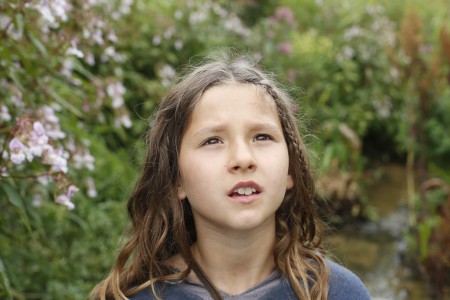
LISE LEPLAT PRUDHOMME AS JEANNETTE
Bruno Dumont does Péguy's Joan as a rock musical
Peter Debruge reviewed Dumont's new film, which is religious and musical, at Cannes for Variety. He said it's a "a bizarre treatment of Joan of Arc's early years" that "flies in the face" of conventions, both musical and religious. It's "a blasphemous assault on French history, religion, and the musical genre." Well, it's an oddball and stunningly original movie, like everything Dumont has done since his debut feature The Life of Jesus in 1997, and each time, as Dennis Lim said at Lincoln Center before the US premiere of this one, "redefining the language of cinema." But in its own slightly bizarre way, this is no different from the musical Les Miserables - only with electric modernistic heavy metal sound, headbanger head-swirling, and amateur acrobatics.
According to Dumont, Jeannette, which uses only local, non-professional actors from his region of origin in northeastern France, is a word-for-word performance of the first of a three-part drama (or mystery, or poem) by Charles Péguy, the first version of which is dated 1897, called The Mystery of the Charity of Joan of Arc. See
French Wikipedia.) Staged in the pretty semi-coastal area where Dumont also filmed his recent Slack Bay and his previous comical L'l Quinquin, it has two Joans, pre-teen (Lise Leplat Prudhomme) and teen (Jeanne Voisin). The actors' singing is recorded live, a capella, as in the movie "Les Miz." The nun who appears to the young Joan is doubled, because Dumont found twins for the part, and could not leave one out. Serendipity plays a part in his work.
Dumont's ability to use naive, untrained actors to capture a feeling of authenticity and raw energy, as well as religious purity, has been seen before, notably inn his 2009 Hadewijch about a girl who enters a convent, and before that his first two films, L"humanité and The Life of Jesus. Something similar happens earlier in the cinematic tradition with Rossellini's Flowers of Saint Francis and Pasolini's Gospel According to Matthew. They didn't think of adding music, and could not have used a local rapper with frenetic hand and body movements to play Joan's uncle.
The Childhood of Joan of Arc/Jeannette, L'enfance de Jeanne d'Arc,105 mins., debuted at Cannes Directors Fortnight May 2017, showing at a dozen other international fests, including Transylvania, Moscow, Karlovy and Jerusalem, as well as Vienna, Portland and SxSW. It opened on FRench TV. AlloCiné gave it a mediocre 3.2 press rating but the perpetually hard to please Cahiers du Cinéma loved it and the hip Les Inrockuptibles was favorable. Screened for this review as part of the NY Rendez-Vous with French Cinema, March 2018. Dumont, appearing with an excellent translator for the Q&A and speaking in mellifluous French, was almost more entertaining than his film. He explained his attitude toward religion and his working method with an engaging and personal kind of clarity that reinforced the admiration I've felt for this amazing artist from the very beginning.

Dumont (left) with interpreter at Q&A after screening [CK photo]
Last edited by Chris Knipp; 04-11-2020 at 11:53 PM.
-
TOMORROW AND THEREAFTER/DEMAIN ET TOUS LES AUTRES JOURS (Noémie Lvovsky 2017)
NOÉMIE LVOVSKY: TOMORROW AND THEREAFTER/DEMAIN ET TOUS LES AUTRES JOURS (2017)
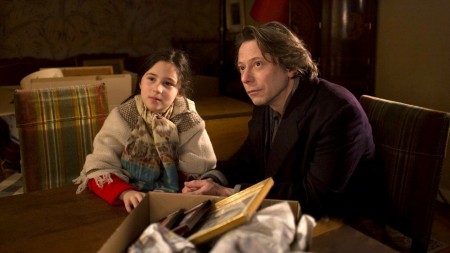
LUCE RODRIGUEZ AND MATHIEU AMALRIC IN TOMORROW. . .
Noémie Lvovsky's intimate and knowing portrait of the love between a young daughter and her mad mother
This new film by the cinematic powerhouse Noémie Lvovsky (who acts, writes, and directs) is a poetic reflection of her own past as the loving and loved child of a mother whose touch on reality was never strong and growing weaker. The film was threatened with cancellation when more than half done after the young star Lucie Rodriguez, who plays Mathilde the daughter to Lvovsky's mother, had to permanently withdraw due to foot surgery. The film was saved by cutting out a hunk of the scenario and injecting an adult Mathilde. Anaïs Demoustier, a young actress with an impressive CV (Bird People, for one) took on this role - and bears a remarkable resemblance to Rodriguez.
One French critic (Nicolas Marcadé, Les Fiches du Cinéma) says Lvovsky curbs here her usual wildness as a writer. Perhaps. Nonetheless, the film's eccentricities create a distance that make it unrelatable at first. Mathilde is first seen in a meeting between her teacher and her mother, who spends the entire time wondering how to say most elegantly in French, "I didn't know what this meeting was for." As she leaves she turns badk and tells the teacher, "I'm not a good mother." The teacher answers, "I'm sure you are doing the best you can." Yes but that's not very good, as we now learn. Next Mathilde's mother doesn't come home till very late and when she does, arrives disheveled in a wedding dress and veil she has bought at a department store. Her husband (Mathieu Amalric, excellent) has moved out some time ago.
This is no ordinary depression. Mathilde's mom lives in another world, one we never enter, and she often literally wanders off. Mathilde has to fix her own meals. She takes refuge not in school, which she doesn't like, and where the other kids make fun of her, but in her own fantasies. When her mother gives her a small pet owl, the bird - as well-realized a character as the film has - the owl, for Mathilde, develops a full-throated human male voice (Micha Lescot) and talks to her; his advice at some points turns out to be crucial. Mathilde, who is dressed in beautiful brightly colored elegant French children's clothing, is moved to steal the school's instructional skeleton and bury it in a park, with all due ceremony.
All this seemed a skittish and frivolous approach to madness. But by the end of the film, one realizes that Lvovsky knows whereof she speaks and one has got a keen sense of the helpless feeling the child of a mad but much loved and cherished parent is like. And the mother played by Lvovsky with a mix of warmth and distance becomes a very real presence.
The turning point for me comes when Mathilde, in a fury of rage and frustration at her mother's failure to come home for the Christmas dinner she has tried and failed to prepare, sets fire to the living room curtains. Only the owl's frantic instructions save the flat. It's a remarkably achieved sequence, and finally it all begins to seem serious and real.
Things get so bad, Mathilde's father comes to the flat to help move her mother to a sanatorium in his modest car as is her mother's wish. Tellingly, she informs him she has seen this coming at least as far back as before Mathilde, who is nine, was born. This sequence is a kind and tender one.
There are no histrionics in this film, and there is no sentimentality. This admirable restraint makes up for passages, like the owl-to-daughter dialogue, that fail to convince.
Demoustier's young adult Mathilde visits her mother at the asylum and their sympathetic dance in the rain is a metaphor for their enduring communication and love. Lvovsky has said in an interview in Libération athat her late mother's memory is so alive she could "still draw the shape of her fingernails." "She was a poetic personality, very intelligent, like an ascetic, incapable of having a social life. She made me tink of Marguerite Duras."
Tomorrow and Thereafter/Demain et tous les autres jours, mins., debuted as the opening night film at the Locarno Festival, Aug. 2017. It opened in French cinemas 27 Sept. 2017 to only fair reviews (AlloCiné 3.2), but critics nonetheless said kind things. Screened for this review as part of the New York UniFrance and Film Society of Lincoln Center Rendez-Vous with French Cinema, Mar. 2018.
Last edited by Chris Knipp; 03-10-2018 at 08:04 PM.
-
THE SOWER/LE SEMEUR (Marine Francen 2017)
MARINE FRANCEN: THE SOWER/LE SEMEUR (2017)
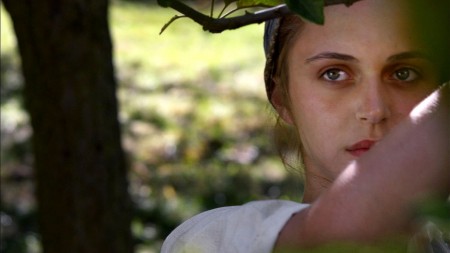
PAULINE BURLET IN THE SOWER
Women without men
The film, which debuted at San Sebastian last September, was favorably reviewed there in Hollywood Reporter by Neil Young, who found "seeds of plentiful promise" in it for both its debutantes, lead actress Pauline Burlet and director Marine Francen. This is an historical drama, focused on a young woman of marriageable age in a small town in the Alps in 1851, when that town is cruelly robbed of all its men following the repression of an uprising that leads to the town being cut off. The women make the unusual pledge that if any man arrives, he will become a "semeur," a sower of seed, for all of them so they may bear children. This story, based on a sketchy but poetically worded text found by the filmmaker (who had to invent the characters except one woman), seems implausible, almost like science fiction. But what Francen does with it is impressive, with images out ofJean-François Millet, as the women are beautifully seen hand-harvesting grain, and situations out of D.H. Lawrence, with the emphasis on passionate feelings and simple, intense sexuality and love. The images are simple - there isn't great variety - but they are beautiful, to fit with the simplicity and purity of the needs and feelings expressed.
This is an economical production. The most challenging scene to shoot comes at the outset when Francen shows us soldiers of Napoléon III rounding up the men of this village and leading them away. For most of the film they don't know if the men are alive or dead or if any of them will ever come back. Focus is on the hand harvesting of the grain, and discussions between the women, with a few emerging. Foremost is Violette (Pauline Burlet). It is she whose text the movie is based on. All the activities are "among women." They can bare their legs if they want: there are no men to find it indecent. In this atmosphere of boldness the idea of using any man who comes along to get them pregnant, so the village won't die out.
According to Neil Young, the source is a 38-page volume called L'homme semence ("The Seed Man") published in 2006, written in 1919 by Violette Ailhaud when she was in her eighties, left to her female relatives to be in their hands in 1952, a century after the events she recounts. As Francen has said, the mid-nineteenth century and towns decimated by the forces of the emperor aren't a time and a place about which much is known.
The Sower has a quality of the simple and elemental found in French films like Frédéric Fonteyne's Gilles Wife, in which I, and Roger Ebert (who wrote a lovely review of it) discovered the face of Emmanuelle Devos (and it was an autumn in Paris when the young Clovis Cornillac, who played Gilles, shone). The elements here are classic and the feel is intense and physical without being realistic. The mountainous region of The Cévennes acquires a glowing luminosity in the cinematography of Alain Duplantier.
After the women, or some of them - but it must get around - make their, at first rather jocular, pact, a man does appear, who says his name is Jean and that he is a blacksmith (Alban Lenoir). He is bearded, robust, and thirty-nine. One woman says she'd hoped for someone younger. But they acknowledge that he is a good-looking man. Circumstances lead him to be most connected with Violette. He has a place to himself. They make it clear how welcome he is, but not their plan. Violette brings him food, they form a connection, and they make love, and fall in love. It becomes clear that he has turned up because he is wandering and is in hiding from something. Thus his status is uncertain. But he stays.
The issue becomes the clash between Jean's "function" for the village women, and the strong love that has developed between him and Violette. There must be much sacrifice on all sides. Violette is also the only woman - now the only person - in the village who can read and write. She becomes a teacher for the children but more importantly she and Jean, who also is literate (is he really a blacksmith?) and they bond and make love over reading poetry of Victor Hugo in bed. This is one of the movie's most original touches.
The movie shines, literally, with its many scenes of sunshiny work in the hay, which may be sweaty and grueling but seem mainly idyllic, and really more cheerful and light and unsentimental than Jean-François Millet's iconic images. Some may think of The Beguiled and Black Narcissus; for me D.H. Lawrence was the best association, and the film's best feature its quiet lyricism. The thought of science fiction brings up a certain implausibility, a lack of relatableness that is The Sower's weakest point. But that there is style and remarkable boldness and accomplishment here is absolutely certain.
The Sower/Le semeur, 100 mins., debuted at San Sebastián, winning the valuable New Directors Prize there, and opened in Paris 17 Nov. 2017 when it received lukewarm reviews (AlloCiné press rating 3.1), but Les Inrockuptibles' Serge Kaganski admired its lack of the heaviness usual with costume dramas and thought it "a first film of a proud and stubborn originality."

Francen with programmer Dennis Lim and interpreter
Last edited by Chris Knipp; 04-24-2018 at 12:27 PM.
-
PETIT PAYSAN (Hubert Charuel 2017)
HUBERT CHARUEL: PETIT PAYSAN (2017)
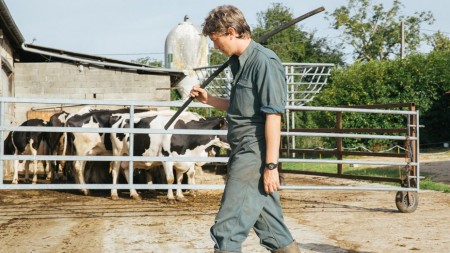
SWANN ARTAUD IN PETIT PAYSAN
The dilemma of a small dairy farmer in a cruel world
The film, originally given the unappetizing English title Bloody Milk, is about a young French small dairy farmer. Pierre Chavanges (Swann Arlaud, whose sensitive, anxious face the camera loves) is bachelor in his mid-thirties who has taken over the farm from his aging (but still ever-present) parents. Little ready to consider the romantic interests of Angélique (the arresting India Hair), the local lady baker pushed upon him by his mother, he lives and breathes the herd 24/7. Pierre treats his cows like persons, and calls them all by their names. In the surreal opening scene we see him literally waking up with the house full of cows. It's just a dream, but shows this filmmaker has a subtle flair. The sequence is the better for being understated. It introduces a movie of quiet power and conviction.
Pierre discovers to his horror that his herd is becoming infected with a dangerous disease - "the Belgian disease," hemorrhagic fever, which is spreading locally, and tries to hide it, because if he let it be known, the health department would order the destruction of the entire herd and he would be ruined. His sister Pascale (Sara Giraudeau) is a veterinarian, which could be an additional danger, or a source of support. She is initially reassuring. But then, if she finds out his suspicion was correct, he's in trouble. He's not ultimately helped by a Belgian farmer with a YouTube channel, who's lost his
Petit Paysan was reviewed at Cannes for Variety by Pamela Pianezza. She notes that the tension "mounts during the first two-thirds of the movie," but is hard to sustain thereafter. He kills and buries the first two infected cows. As Pianezza notes the first cow "execution" is "shot like a murder scene," and at this point the film has the air of a thriller; this is "one of the film's strongest moments."
Charuel has some trouble sustaining the suspense toward the end of the film, in Pianezza's view, but she still feels the script (co-written with Le Pepe of Love at First Fight/Les combattants, "keeps its promises, portraying a desperate dairy farmer who, while not as complex or explosive as the one Mattias Schoenaerts embodied in Bullhead, remains a compelling and rarely seen character in French cinema." The son of dairly farmers who might have taken over their farm as Pierre does but chose to attend La Fémis instead, Charuel knows whereof he speaks and this film is a labor of love. He draws extensively on his own rural French upbringing for the film, and in fact shot it on his parent's land. This aspect brings to mind Francis Lee's excellent recent film God's Own Country, shot in his native Yorkshire near where he still lives. I loved this film, even if it may seem to fizzle out a bit toward the end.
The title, Petit paysan ("Small Peasant [farmer]") points to the fact that Pierre is part of a dying breed, a small farmer struggling to survive in a world where agribusinesses have taken over. If there is an air of desperation about Pierre's plight and the situation he is in is horrible, it's just a ramping up of the situation many family farmers face.
Petit Paysan, also known as Bloody Milk 90 mins., debuted in Cannes Critics Week May 2017; also in a half dozen other international festivals, opened in French cinemas 30 Aug. 2017, and was then widely reviewed, with an AlloCiné press rating of 4.1. Screened for this review as part of the New York Rendez-Vous with French Cinema, Mar. 2018.
Showtimes March 11 1:00 PM
March 14 4:00 PM
Last edited by Chris Knipp; 03-11-2018 at 08:33 PM.
-
CUSTODY/JUSQU'À LA GARDE (Xavier Legrand 2017)
XAVIER LEGRAND: CUSTODY/JUSQU'À LA GARDE (2017)
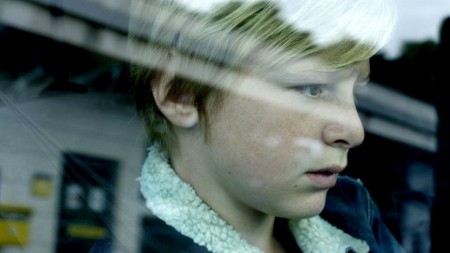
THOMAS GLORIA IN CUSTODY
Male violence in families, a feature based on research
Well received at Cannes, Xavier Legrand's Custody/Jusqu'à la garde plunges the audience into an almost unbearable family situation of a bad dad and doesn't let go. It was reviewed by A.A. Dowd of AVClub and Boyd van Hoeij of Hollywood Reporter. Dowd says, "Custody doesn’t do much more than plunge the audience into this hellish situation, but it shrewdly understands the bad dad’s pathetic pathology, and the film may resonate for anyone who’s grown up under the unhealthy supervision of a mean bastard. Take that as a sobering recommendation."
This is the actor Xavier Legrand's first feature as a director, which grew out of the plan for a series of shorts, specifically from one, 2013 short, Avant que de tout perdre (Just Before Losing Everything), a 2014 Oscar nominee for Best Live Action Short, in which a mother flees a violent husband with her two children.
The film begins with what we would call a custody hearing, here the Juge d'Instruction meets with the mother (Léa Drucker) and father (Denis Ménochet) - both of wom ere in the short in similar roles - of Julien (Thomas Gioria), with their lawyers (female) to decide whether the father, Antoine Besson, is to share custody of Julien. There is an older sister, Josephine (Mathilde Auneveux), but custody isn't an issue with her. A statement from Julien is read stating that he hates and fears his father and does not want to have any contact with him. The lawyer for Antoine is more forceful and articulate than Miriam's, the mothers, and though statements suggest Antoine is highly suspect, the other side lacks concrete evidence of his violent and threatening behavior. He has given up his job and moved to be near the children and his wife, which suggests he values them. Of course, in the event, it is only proof of an unhealthy obsession that makes him increasingly dangerous.
This is the key scene, because it shows a faulty system. The judge decides Antoine can share custody. This proves horrible for the boy and ultimately dangerous for him and his mother. His sister is in process of getting pregnant at 18 and going off to form her own family with a young man. Why did the judge not see this was a dangerous man? Because the hearing was too short, and she did not receive enough information.
The well-staged, horrific scenes of Antoine's hostile, menacing, invasive behavior are interrupted by a big party for Josephine's birthday, a sequence of almost violent and exaggerated merry-making that shows the first-time director's over-enthusiasm. In the smaller family scenes in cars and apartments he is impeccable, and shows the benefits of three years of careful research into the behavior of violent spouses. AS the chief victim at the center of this situation forced into a state of hypervigilance, Thomas Gloria is disturbingly convincing. At the Q&A after the film was shown at Lincoln Center, Legrand pointed out that every day and a half a woman dies at the hands of a violent man in France. It is his concern over this tragic situation and a broken system rather than personal trauma that led to his making this singularly unpleasant but unforgettable and significant film.
Custody/Jusq'à la garde, mins, debuted at Venice Sept. 2017, showing next at Toronto and 20 other festivals. Screened for this review as part of the New York Rendez-Vous with French Cinema, Mar. 2018. Released theatrically in France 7 Feb. 2018, it received rave reviews (AlloCiné press rating 4.2). Metacritic rating [was 8̶2̶%̶ now:] 83%. It will be released by Kino Lorber in the US.

Xavier Legrand (l.) at Q&A after screening
Last edited by Chris Knipp; 02-24-2024 at 09:42 AM.
 Posting Permissions
Posting Permissions
- You may not post new threads
- You may not post replies
- You may not post attachments
- You may not edit your posts
-
Forum Rules





 Reply With Quote
Reply With Quote









Bookmarks